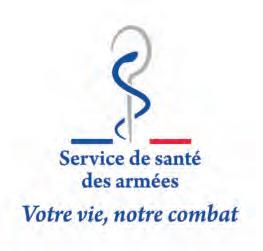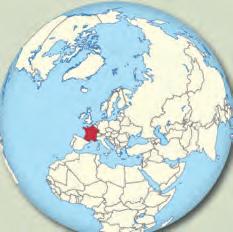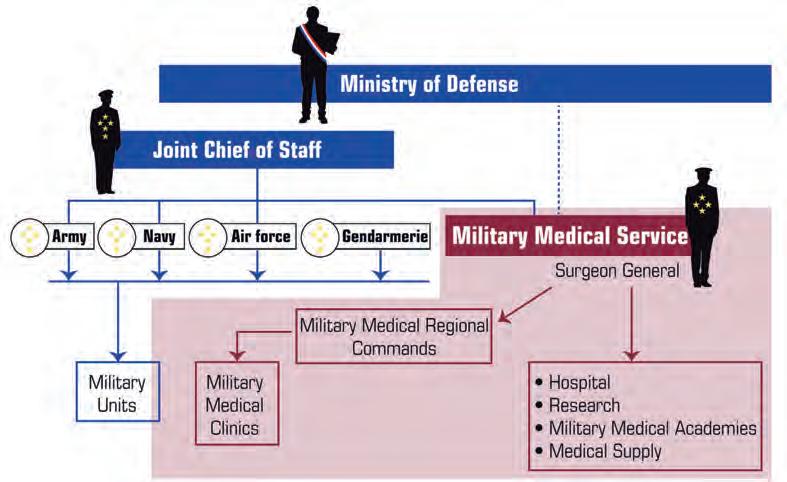
8 minute read
French Republic
Capital: .......................................... Area: .............................................. Population: .................................... Official Language: ........................... Armed Forces Personnel: ................. Medical Officers: ............................. Military Hospitals/Institutes: ........... Missions: ........................................

Advertisement
Paris 643 801 km² 66 607 602 French 278 715 1.827 8/3 multiple
Surgeon General
Maryline Gygax Généro Lieutenant General The main mission of the French Military Medical Service (Service de santé des armées) is to provide a medical support of the Armed Forces everywhere, in any time and any operational circumstances. The French Military Medical Service (FMMS) is placed under the authority of the Joint Chief of Staff and its headquarters are located in Paris, since 2015: Balard (south-west area) and historically in Vincennes (east of the Capital) Ministère de la Défense Direction Centrale de Service de Santé des Armées 60 Boulevard du Général Martial Valin CS 21623
Basic Task of the Military Medical Service
Structure

75 509 Paris cedex 15
The Military Hospitals
The component of the FMMS is going through a major reorganization (SSA 2020 Project). The new hospital model principles are focused on operational tasks and an opening to the civilian and public health system. Within this framework, 2 platforms with 2 military training hospitals each and close to an air force base: Paris and Toulon-Marseille areas which activities are focused on trauma, surgery and infectious diseases. Additionally, the FMMS still incorporates 4 other military non-platform hospitals (Bordeaux, Brest, Metz and Lyon) which activities are based on several principles such as intensive care and surgery integrated in civilian hospitals, the rehabilitation of physical and mental injuries, the response to a
sanitary crisis, several armed forces medical clinics linked with emergency military hospitals units or a common civil-military management as well. Since 2015, several major events lead the FMMS to improve significantly its cooperation with the Ministry of public health establishing specific trainings (war surgery in national territory, military medical support to civilian population) and the military hospitals became a main actor in this context.
The Armed Forces Medical Clinics
The medical support to operations, and on the national territory, is provided by military healthcare personnel who work through Armed Forces Medical Clinics (CMA). Covering the whole country, these ones are active overseas, onboard Navy ships as well as beside the French troops abroad. Since 2014, the primary healthcare provided to armed forces is on a complete evolution to provide an adapted medical support to each branch (Army, Navy, Air Force and Gendarmerie). Armed forces medical support has to be considered more through a specific organization than from a territorial approach as today. By 2018, these Armed Forces Medical Clinics will be led by a medical command facility called “medical armed forces new generation clinics” (CMA NG) through a priority given to the type of support. Offering the most dapted medical support to different types of military units (flying personnel, paratroopers, divers …), their goals remain healthcare, expertise, pre-deployment training and deployment. These CMA NG will be responsible for Command and Control the Armed Forces Medical Clinics and will draw up all administrative, financial and management tools.
Military medical supply chain
The mission of the FMMS Military Medical Supply Chain (MMSC) is to provide medical supplies and replenishments to its units whenever and wherever a medical support is needed. This means that MMSC delivers and sustains support to the continental units as well as to the overseas units and to the deployed operational units. The structure of the MMSC relies on a directorate and 5 specialized centres: 1. The Armed Forces Drugs and Material Directorate settled in Orléans (DAPSA) heads the MMSC. 2. The Armed Forces Drugs and Material centres settled in Vitry-le-François and in Marseille (ERSA). 3. The Armed Forces Pharmaceutical centre settled in Orléans (PCA) is both a pharmaceutical R&D laboratory and a factory. 4. The Armed Forces Medical Material Development and Main tenance centre settled in Orléans (ECMSSA) is the engineering centre for biomedical equipment. 5. The Armed Forces Blood Transfusion Centre settled in Clamart (CTSA) deals with blood products such as plasma, platelets and blood cells.
The Armed forces centre for epidemiology and public health (CESPA) main mission is to implement public health policy within the French Defense community. To achieve this goal, the CESPA is divided ito 4 departments with specific missions: 1) The Military Health Intelligence Department whose mission is to identify potential health risks for Armed forces. 2) The Health Surveillance and epidemiology Department that monitor the health of the Armed forces and perform investigations of health events. 3) The Epidemiology and Clinical Research Department that is responsible for clinical and epidemiological research methodology support and education. 4) The Health Promotion, Prevention and Programs Department whose mission is to develop health education and evaluation of projects. A fifth department is to be created to implement Pest and Vector Control policy for French armed forces. Public health is a large field, at crossroads between several medical specialties and social sciences. Hence, CESPA works on several topics, on communicable diseases such as malaria, arboviruses, diarrhea or sexual transmitted infections; but also on non-communicable diseases like post-traumatic stress disorders, addictions or physical injuries due to military/ sports training. To complete its activities, CESPA takes part or organizes several training courses for civilian and military students in relation with national universities and international bodies like NATO Military medicine centre of excellence. It also takes part to several expert committees to produce guidelines in its areas of expertise. Finally, CESPA has developed international collaboration with several organizations notably with NATO.
Medical Education/Training
Three schools ensure the initial and general training of the personnel of the FMHS: the “Ecole du Val-de-Grâce (EVDG)” in Paris, the Military Medical School (ESA) in Lyon, and the paramedical Personnel School (EPPA) in Toulon. In collaboration with the University and the nurses education institutes, this education give to all students state diplomas for medical and paramedical in all the variety of medical and paramedical specialties. The basic military education, and specific courses given in parallel, prepare them for operational missions in military contexts. Ne-
vertheless, the structural changes of the French Health Service induce a gradual transfer of the EPPA from Toulon through the ESA site in Lyon. The training of nurses and nursing assistants will be outsourced to civilian education institutes in Lyon.
Ecole de santé des armées (ESA)
The French Military Medical Service academy in LyonBron was inaugurated on 1st of July 2011 after the two medical schools based in Bordeaux and Lyon closed their doors. The global mission of the military medical corps comprises four main steps regarding (academic) education and (professional) training for physicians. We help our cadets to become great practitioners throughout their time at university by providing them with all the logistics and scientific means they need. They follow military training to acquire the skills and abilities that officers should possess. They are also trained to provide medical and urgent care in a challenging environment and in combat under fire. This represents an 1800-hours course delivered during the six years spent in the academy. Once the course is completed, they are awarded a professional master in addition to their medicine doctorate.
Ecole du Val-de-Grâce (EVDG)
Born on 1st October 2005, the Ecole du Val-de-Grâce (Military Medical Academy) is the heir to the Ecole d’Application du Service de Santé des Armées. Its aim is firstly to bring together all the teaching and training of the various military medical personnels. To this end, it relies on the Military Medical Academy of Lyon, the paramedical personnel School of Toulon, the military hospitals and any military medical facility that provides training. Moreover, it organizes further education for physicians, pharmacists, veterinarians, dentists and administrative officers, adapted to their missions for different armies. It also provides ongoing training of officers in active duty or reservists, nurses and specialized paramedical technicians, as well as foreign students.
Defense Biomedical Research Institute (IRBA)
IRBA is in charge of conducting the research program the French Military Medical Service requires to support the French armed forces in the biomedical domain. The aim is to improve human protection considering the environmental and human factors constraints of operations, to develop up-to-date medical countermeasures against CBRN threats and to identify new therapies and care procedures for battlefield injury and disease. Born in 2009 from merging the various SSA research institutes in a unique structure, IRBA is now settled in recently inaugurated facilities (south of Paris). Together with state-of the art scientific equipment, this location close to headquar ters and military hospitals as well as to major universities and research centres, puts IRBA in a key network to perform the mission. A large set of interactions is built with military/civilian, scientific/operational partners that leverages IRBA own resources and provides a vivid community to address Defense and Security biomedical challenges both for military and national purpose.

The Military radiation protection service (SPRA)
The French military radiation protection service (SPRA) was established in 1973. It provides technical support of military units in the area of radiation protection. It is located at Percy Military Hospital, which specializes in the management of military or civilian emergencies. The SPRA has 75 military and civilian employees. Since 2005, it is charged to provide occupational medicine, especially the medical and radiobiological supervision of people exposed to ionizing radiation in the French Ministry of Defense; hygiene and safety (technical controls at installations); regulation; education (conducting more than 800 hours of training courses per year) and intervention in the case of a radiological incident. On behalf of the French Military Medical Service, the SPRA has initiated conventions with institutions like the French Atomic Energy Commission (CEA), EDF Group (Electricité de France), AREVA group, and the French Radiation Protection and Nuclear Safety Institute (IRSN) in order to provide the best medical care for radiation related victims.










